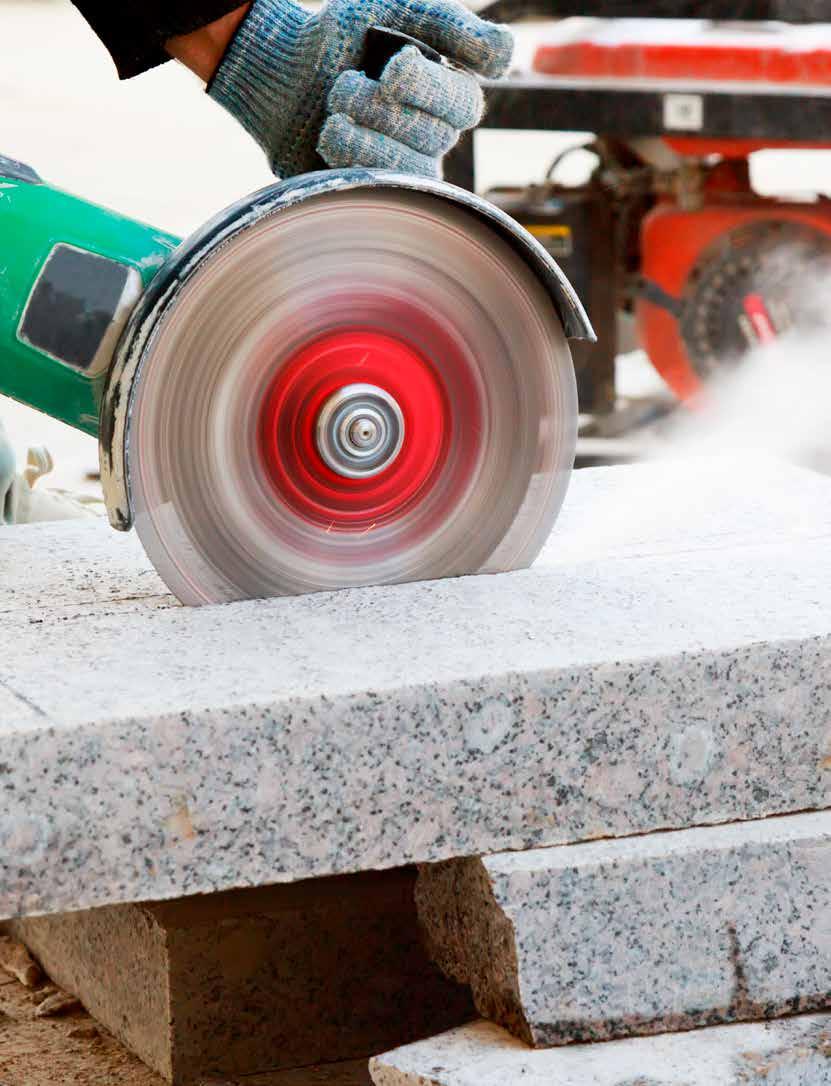
3 minute read
Breathe freely: help at hand
The risks of working with engineered stone benchtop products are being highlighted due to more than 400 Australian workers being diagnosed with irreversible silicosis from breathing in the dust. Now, a new Breathe Freely NZ campaign looks to prevent occupational lung disease of all kinds. NZ Plumber takes a look.
Last year, Queensland stonemason Anthony White died of accelerated silicosis. Anthony was 36. He was the first person in Australia to die from this incurable lung disease as a result of working with an engineered stone product used in kitchen benchtops and bathroom vanities.
The product contains up to 95% crystalline silica. When cut, ground, drilled or sanded, this creates respirable crystalline silica dust (RCS), most of which is invisible to the naked eye. If inhaled, this dust can cause silicosis, an irreversible and progressive fibrosis of the lungs.
Accelerated silicosis is a form of the disease that develops in just one to 10 years, due to the inhalation of very high concentrations of RCS. Exposure to RCS can also cause lung cancer, chronic obstructive pulmonary disease (COPD) and kidney disease.
Before he died, Anthony White spoke out publicly about his disease, as he wanted to save other lives by raising awareness. An audit of the stone industry, carried out by the Queensland Government, found he was among 98 workers in the state who had contracted silicosis, with 15 of those cases terminal.
Subsequently, both Australia and New Zealand have been highlighting the dangers, and WorkSafe New Zealand has carried out visits to 113 benchtop factories to audit compliance, educate managers and workers of the risks, and stress the importance of training everyone in the necessary controls.
The WorkSafe website has silicosis information for anyone involved in working with engineered stone benchtops. This includes plumbers and gasfitters, who could find themselves modifying these benchtops to install tapware or gas hobs.
In a broader move, a Breathe Freely NZ campaign was launched this July by the NZ Occupational Hygiene Society, with WorkSafe's support. Its aim is to prevent occupational lung disease from any construction industry activity by outlining the hazards and providing control options to manage risk.
The accompanying Breathe Freely website includes advice on managing risks to health from a range of substances, such as welding fumes. The website contains practical information targeted at specific sectors, including plumbing and gasfitting.
WHO’S AT RISK?
The prevalence of accelerated silicosis in NZ is not yet known, but WorkSafe is raising awareness of the risks involved in working with engineered stone and the safety controls that should be used. Those at risk of exposure to respirable crystalline silica (RCS) include:
1Workers who fabricate engineered stone benchtops without adequate controls in place
2Those who may modify the benchtops as a part of the installation process or to accommodate new fittings, such as cooktops or tapware. If you are uncertain about whether or not a benchtop is made from engineered stone, ask the principal contractor, designer or homeowner. If you can’t get a definite answer, assume the benchtop is made from engineered stone, and implement appropriate controls. Benchtops made from other stone materials (such as granite) still contain crystalline silica, albeit at lower concentrations than in engineered stone, so you can use the same controls to minimise exposure to RCS.
WHERE TO FIND
INFORMATION
www.breathefreely.co.nz – this new website provides specific guidance for plumbers, pipe fitters and gas heating engineers on managing lung disease risks from a range of work activities. www.worksafe.govt.nz – includes the following guidance (type Silicosis in the website search bar to find this information): • Silica dust in the workplace • Information for workers on controlling silica • Controlling dust with on-tool water • Controlling dust with on-tool extraction.










